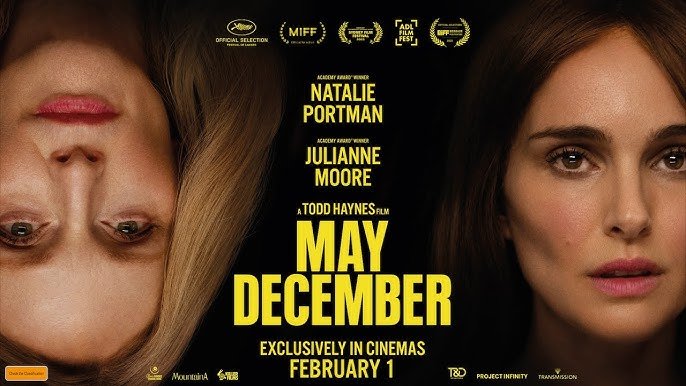'May December' Review
Photo Courtesy: Netflix
‘May December’ straddles the competing demands of the salacious and the pointedly highbrow. Filmmaker Todd Haynes is supported in this endeavour by powerful performances from his three leads. Yet it is in this attempt to satisfy the demands of these two distinct, competing modes that a pronounced chasm appears at the centre of this film.
May December’ takes place in coastal Savannah, Georgia in 2015. We follow television actress Elizabeth Berry as she ingratiates herself with the inspiration behind her latest project, notorious local couple Joe and Gracie Yoo, who have a 23 year age gap. Berry courts the Yoo’s, gaining access at first to social gatherings and even their own home. Yet fractures appear in this inherently fragile relationship as she engages their closest confidantes, and enemies, in charming yet revealing conversation. Lurking at the centre of their story, moreover, is the insidious scandal of sexual abuse that occurred some twenty years ago. In a thrilling break from convention, we are treated to heavy-handed music throughout that serves as a perfect parable for the tabloid seediness that besets our central romance.
It is immediately apparent that Natalie Portman is at ease in her role as Elizabeth. Portman, herself well-versed in Hollywood’s dubious standards of childhood propriety, plays a suitably opaque lead. Haynes openly indulges in the visual opportunities afforded by Portman, an actress whose eyes are friendly yet forever shrewd, cheekbones slight yet sharp. We are inescapably suspicious. We learn that Portman’s character and Gracie, played by Julianne Moore, had vastly different upbringings: Elizabeth’s mother wrote a book on epistemic relativism, Gracie’s a recipe for blueberry cobbler. So it is that we, the viewer, are fated to follow two characters with dubious sympathies.
Set against the two is Joe, endearingly portrayed by Charles Melton, an accomplished nurse yet ill-formed adult. It is here that Haynes finds firm footing. Our encounters with Joe reveal traces of the lingering effects of his childhood trauma. This is ground that has been tentatively covered in recent years, from the small-screen (‘A Teacher’) to the big screen (‘The Lifeguard’). I appreciated Haynes’ subtle nods to Joe’s disrupted maturity as he lounges in front of his television, flirts poorly over text, and indulges in a love of insects. This is effectively complicated by Gracie’s largely self-conceived naivety. We rightly scorn her attempts at self-abnegation when stating “He grew up quickly; I grew up sheltered”. It is rather more difficult to do so when we discover Gracie herself was married straight out of high school, because of her father’s supposition “You’re either leaving this house in a box or in a veil”.
What follows succeeds as a movie rich with ideas. Ideas about the rush to grow up, and the child-like state that is lost in the process. Yet this is as much a drawback as a strength. For while it reveals a filmmaker cleverly engaging with the opportunities afforded by deliciously taboo subject matter, it somehow remains just that: arch. I found myself noticing and appreciating each detail in equal measure, but could not sit back and appreciate the movie itself. I was thrilled to witness our poor, stunted man-child share his first joint with his son atop a roof, a moment which appears touching on the surface but is fated to be deeply disturbing. Although ‘May December’ successfully provokes much discomfort and chin-stroking, it fails to fully realise its ambitions as a moving melodrama. In the act of watching, I felt myself noticing these touches without ever truly engaging with them. So much so that by the time Elizabeth recognises that she has overstayed her welcome, I almost felt surprised. I was too caught up in the incidentals that I had failed to notice what it all meant. This is aptly surmised at film’s end. “Can we do it one more time?”, Elizabeth pleads at the film’s close, “It’s getting more real for me.”

